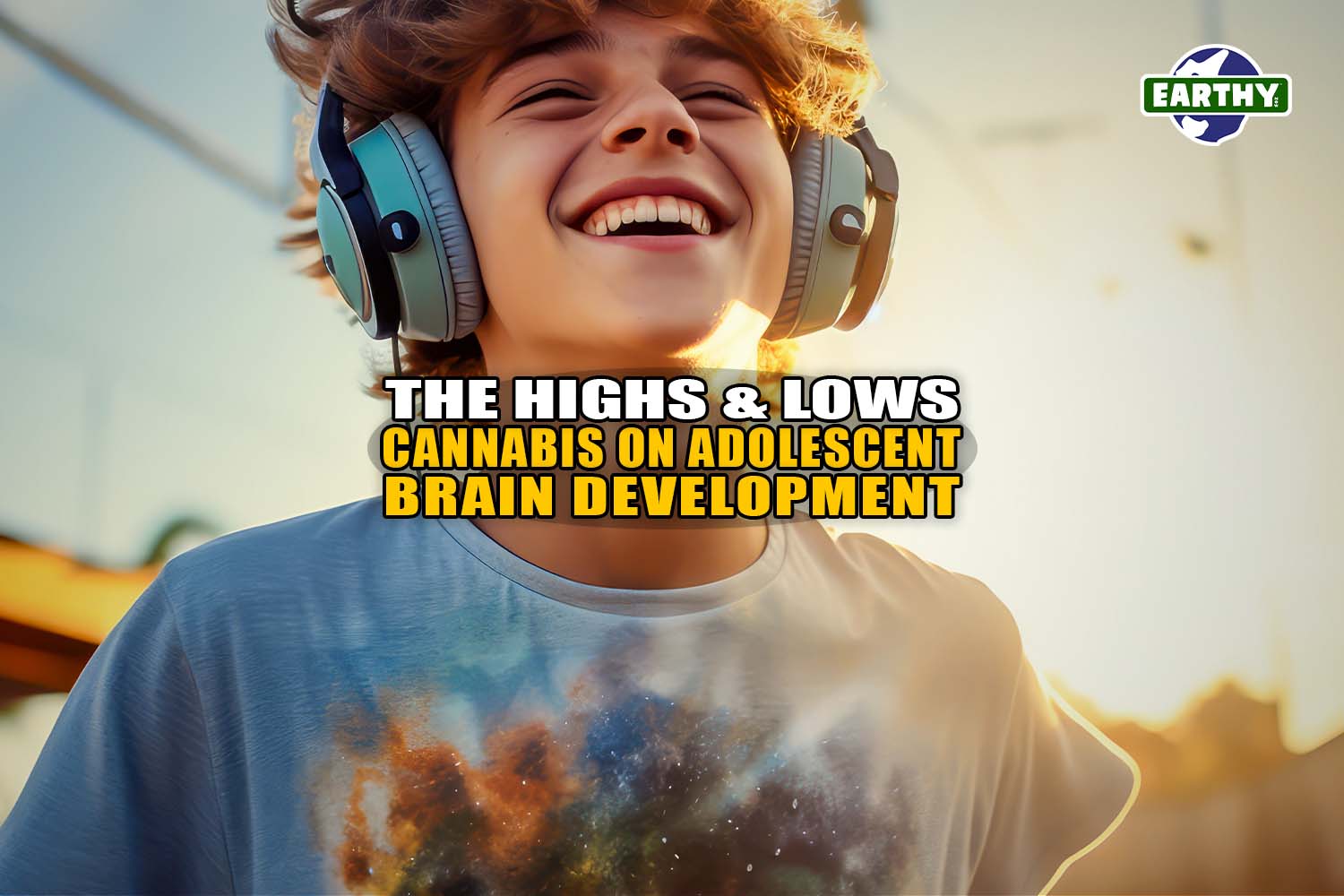Cannabis use has become increasingly popular among teenagers, raising concerns about its effects on adolescent brain development. According to experts, adolescence is a crucial period marked by significant brain maturation. Thus, exposure to drugs can have lasting consequences [1]. Here, we’ll explore how cannabis affects the brains of teenagers, answering some pressing questions about cannabis use among adolescents and young adults.
How does weed affect the brain of a teenager?
The adolescent brain undergoes significant changes during puberty, especially in areas like the prefrontal cortex, responsible for decision-making, impulse control, and reasoning [1]. Notably, tetrahydrocannabinol (THC) use during this time can disrupt normal brain development, particularly in areas involved in memory, attention, and emotional regulation [2]. However, experts highlight that cannabidiol (CBD) products, which typically do not elicit psychoactive effects, likely do not affect the brain in this way. For example, a recent study showed that CBD did not impair brain development in adolescent mice [3]. Whether this is applicable to humans remains to be seen but potential has been detected.
How to Talk to Your Kids About Cannabis
Effects of cannabis on adolescent brain development
Some concerned parents and teens have posed the question: Does cannabis kill brain cells? While there is no conclusive evidence that it kills brain cells, research shows that chronic cannabis users may experience cognitive impairment, especially with high-potency cannabis [4]. Regular use among adolescents affects the endocannabinoid system, which plays a crucial role in regulating mood, memory, and cognitive function. Hence, a disruption of this delicate system can lead to long-term issues. For example, some researchers suggest that adolescent cannabis use can contribute to attention deficit hyperactivity disorder (ADHD), reduced academic performance, and mental health disorders [5].
Avoid the Cross-Faded Effect: Cannabis and Alcohol Combined
Effects of smoking on the teenage brain
Recently, researchers have found a link between cannabis, particularly marijuana, use in young people and several adverse health effects, including cognitive impairment and changes in brain structure. According to their data, these changes may impair judgment, increase impulsivity, and reduce the ability to process complex information. [2]
Additionally, the effects of cannabis on adolescent brain development can potentially lead to or exacerbate pre-existing mental disorders such as anxiety, depression, and even psychotic symptoms. Early cannabis use has also been associated with an increased likelihood of developing cannabis use disorder, a condition that affects brain function and behavior, leading to drug dependence [6].
How many teens use cannabis?
According to the National Survey on Drug Use and Health, nearly half of high school students have tried cannabis at least once [7]. However, a surprising percentage of US high school students have never tried it. While experimentation with cannabis among teenagers is common, regular and chronic use is more concerning [8].
It’s important to note that cannabis use among teens is often influenced by perceived risk. In other words, as legalized marijuana and hemp becomes more widespread, the perceived risk of cannabis use tends to decrease. This changing perception may explain the rising rates of adolescent use. Hence, many teenagers may underestimate the risks associated with cannabis, believing it to be a harmless recreational activity [9].
Is it illegal to let your child smoke cannabis?
Some parents may wonder, “Should I let my 17-year-old smoke weed?” In fact, in all US states, it is illegal to allow minors to smoke marijuana, even if the state permits recreational use for adults. Moreover, encouraging or facilitating adolescent cannabis use can lead to legal consequences and social implications. Because adolescent exposure to cannabis can have short- and long-term effects on brain development, adults who allow underage cannabis use cross not only legal lines but also ethical ones [10]. The variability of state laws for hemp and cannabis, and national law, can make navigation difficult.
Cannabis and Aging: Potential Benefits for Seniors
How many teens abuse cannabis?
Experts estimate that a small but significant percentage of adolescents—about 1 in 40—develop cannabis use disorder, a condition marked by problematic cannabis consumption and drug dependence [11]. Notably, the National Institute on Drug Abuse maintains that early and frequent cannabis use may lead to a higher likelihood of adolescents developing a substance use disorder in young adulthood [12].
Also concerning, adolescents who frequently use cannabis may experience lower life satisfaction and poorer educational outcomes. Chronic cannabis consumption during adolescence may lead to impaired driving and risky behaviors. It follows, experts maintain, that teen cannabis use increases the likelihood of accidents and injuries among young adult drivers [13].
Cannabis use and the adolescent brain
Adolescent brain development is a critical period in a young person’s life, with ongoing changes that continue into young adulthood. Thus, cannabis users who begin at an early age risk disrupting the delicate balance of brain maturation. Indeed, studies have shown that first-time cannabis users during adolescence may experience changes in the developing brain that impact cognitive abilities, emotional regulation, and decision-making skills [2].
Additionally, research highlights significant associations between early cannabis use and mental health problems later in life. For example, early cannabis exposure has been linked to the development of depressive phenotype in some adolescents, with significant differences seen in those who begin using cannabis during their teenage years compared to those who start in adulthood [14].
Does cannabis kill brain cells?
While cannabis may not directly kill brain cells, growing evidence suggests that adolescent drug use can lead to cognitive impairment and other lasting changes in brain function. More specifically, the effects of cannabis on brain development may affect the prefrontal cortex, which continues to mature well into young adulthood [4].
Cannabis also affects the human brain by interfering with normal communication between neurons, leading to altered brain function. Even more concerning, chronic cannabis use can result in a wide range of behavioral and cognitive changes, including memory deficits, attention problems, and poor decision-making [15].
How Does Cannabis Use Affect Cognitive Function?
What are the long-term effects?
The long-term effects of adolescent cannabis use are unclear. However, early findings suggest that teenagers who regularly use cannabis are more likely to develop cannabis use disorders in adulthood. Also, some may experience difficulties with concentration, memory, and learning [2].
Recently, the American Journal of Drug and Alcohol Abuse published a report indicating that marijuana use during adolescence can lead to an increased risk of substance abuse in the future. Indeed, young adults who begin using cannabis at an early age may be more likely to experiment with illicit substances, further increasing their risk of addiction and mental illness [16].
Arguments against cannabis being a “gateway drug”
Some researchers argue that cannabis is not inherently a “gateway drug.” This perspective challenges the common belief that its use leads to experimentation with harder substances. According to this argument, individuals who use cannabis might use other illicit drugs for other reasons. They maintain that the correlation does not necessarily indicate causation. For example, social, environmental, and psychological factors, such as peer pressure, socioeconomic status, or mental health issues, may play a larger role. Moreover, studies have shown that the majority of cannabis users do not progress to harder substances. Labeling cannabis as a gateway drug, these researchers conclude, oversimplifies the complex web of factors contributing to drug abuse [17].

Legalized marijuana and its impact on teens
As more states and countries move toward legalizing marijuana, many worry about the impact of recreational use on young people. For instance, they point to the social research that indicates teenagers are more likely to try marijuana when it is legal and easily accessible. While medical use of marijuana may be beneficial in certain cases, such as helping with the side effects of cancer chemotherapy, recreational use among adolescents carries significant risks [9].
Thus, parents and educators must remain vigilant about the dangers of marijuana use among teenagers. Indeed, the fact remains that adolescent drug use can lead to a range of adverse health effects, from cognitive impairment to mental health issues, especially when adolescents have certain environmental or genetic predispositions [14].
Unveiling the Secret of Earthy Now’s Success in the Hemp World
Key takeaway: the effects of cannabis on adolescent brain development
The effects of cannabis on the adolescent brain are complex and multifaceted. While cannabis may have potential wellness benefits for adults, its impact on young adults and teenagers is cause for concern. The developing brains of teenagers are particularly vulnerable to the negative effects of early cannabis use. In summary, THC’s effects on a young brain may include cognitive impairment, changes in brain structure, and an increased risk of substance abuse [2]. However, CBD and other non-psychoactive cannabinoids appear to be safe for teens [3].
As legalized marijuana and hemp become more common, parents and advocates must educate young people about the potential risks and help them make informed decisions. Whether it’s understanding the effects of smoking on the teenage brain, recognizing the signs of cannabis use disorder, or addressing the legal and social consequences of drug use, awareness is critical. As a culture, we need to protect the health and well-being of the next generation collectively.
For safe, high-CBD, low-THC cannabis products, visit Earthy Now for elevated wellness!
Panic to Peace: How Cannabis Can Calm Your Inner Storm
Medical Disclaimer / Legal Disclaimer – Information is provided for educational purposes. It does not and is not intended to constitute legal advice or medical advice. We attempt to be accurate and up-to-date, but the legality of cannabinoids and the science of cannabis are evolving. The author is neither a legal professional nor a medical expert. Before buying or using any products, you should check with your local authorities and medical providers.
References
- Youth and the Developing Brain
- Effects of Cannabis on the Adolescent Brain
- Cannabidiol Exposure During the Mouse Adolescent Period Is Without Harmful Behavioral Effects on Locomotor Activity, Anxiety, and Spatial Memory
- Does Marijuana Kill Brain Cells?
- Adolescent Cannabis Use, Comorbid Attention-Deficit/Hyperactivity Disorder, and Other Internalizing and Externalizing Disorders
- Teens Who Use Marijuana More Likely to Suffer Mental Health Disorders
- Key Substance Use and Metal Health Indicators from National Survey
- Marijuana Use in High School
- Nondisordered Cannabis Use Among US Adolescents
- Marijuana and Teens
- Recreational Cannabis Use By Teens Linked to Risk of Depression
- Cannabis Drug Facts
- Effects of Adolescent Cannabis Use on Motivation and Depression: A Systematic Review
- Cannabis Use, Depression and Self-Harm: Phenotypic and Genetic Relationships
- Cannabis in Adolescence: Lasting Cognitive Alterations and Underlying Mechanisms
- Long-term Consequences of Adolescent Cannabis Use: Examining Intermediary Processes
- Using Marijuana May Not Raise the Risk of Using Harder Drugs





